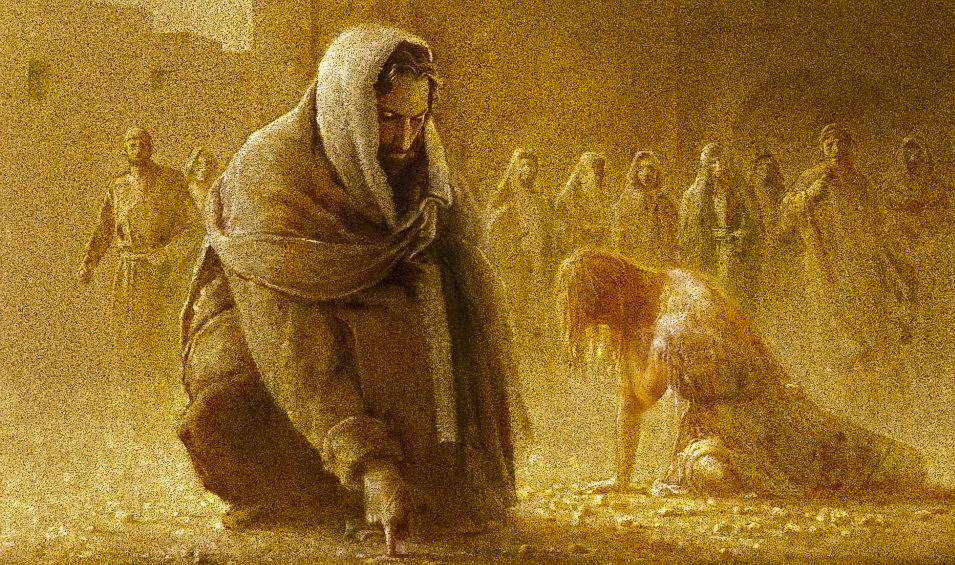
Posted on 04/06/2025 7:23:33 AM PDT by fidelis

Jesus went to the Mount of Olives. But early in the morning he arrived again in the temple area, and all the people started coming to him, and he sat down and taught them. Then the scribes and the Pharisees brought a woman who had been caught in adultery and made her stand in the middle. John 8:1–3
What a painful and humiliating experience this must have been for this woman! Fortunately, the Savior of the World was there to care for her and to help her navigate this situation through His abundant mercy. Though she was a sinner, God’s mercy offered a remedy for her sin and its consequences.
Interestingly, this story is not included in some of the most ancient manuscripts of the Gospel of John. Saint Augustine believed that it was excluded by some of the early copyists of this Gospel because they were moral rigorists and were scandalized by the depths of Jesus’ mercy. They feared that if this incredible act of mercy was conveyed to others, it would lead to a relaxation of moral rules.
The scribes and Pharisees who brought this woman to Jesus also appeared to be scandalized by Jesus’ mercy. Thus, the depths of mercy offered to this woman was one of many occasions in which Jesus was merciful to a point that was hard for the people to comprehend.
How about you? How far are you willing to go when it comes to mercy? It is easy for us to resort to condemnation when we see the sins of others. We might feel justified in condemning them and even obliged to do so out of a desire to condemn sin itself. But Jesus’ action shows that the sin must not be equated with the sinner. Sin must be condemned and was condemned by our Lord when He said to this woman, “Go, and from now on do not sin any more.” Though He condemned her sin, he did not condemn her: “Neither do I condemn you.”
The mercy of God is incomprehensible. For example, recall that Jesus cried out from the Cross, “Father, forgive them, they know not what they do.” Imagine the surprise that the first hearers of those words would have had. How could this man ask that God forgive the people who were murdering Him? Perhaps the only person who truly understood this prayer of mercy from the Cross was Jesus’ own mother as she stood there gazing at Him with love.
An important lesson for us to learn from Jesus’ depth of mercy is that, at first, it will most likely scandalize us also. Mercy to this extent is supernatural. It challenges our natural reason and calls us to a new way of thinking and relating to others... Are you allowing the apparent scandal of God’s abundant mercy to transform you so that it is no longer a shock or scandal to you, but is experienced as good and holy and from the Heart of our God?
Reflect, today, upon how deeply you understand God’s mercy. Do you rejoice when mercy is offered to another? Or do you find yourself condemning? Our Lord said, “Let the one among you who is without sin be the first to throw a stone at her.” None of us are without sin; therefore, none of us has the right to cast a stone at another. Allow the apparent scandal of God’s mercy to challenge you so that you come to not only understand God’s infinite mercy but also to act as an instrument of that mercy to everyone.
Most merciful Lord, You came to call the sinner to repentance and salvation. You offer mercy and forgiveness in superabundance. When faced with the sins of others, help me to imitate Your love for them and to show mercy and compassion to the greatest degree. I love You, Lord. Help me to love You and others with Your Heart of merciful love. Jesus, I trust in You.
Please keep in mind that this is a Catholic Caucus/Devotional thread for the purpose of prayerful reflection on the Sacred Scriptures and is closed to debate of any kind. Per FR policy on Religion Caucus threads, off-topic, argumentative, and abusive comments are not allowed and will be submitted to the Mods for deletion. Thanks, and God bless you.


April is the month dedicated to devotion to the Blessed Sacrament:

“ So Jesus said to them, “Truly, truly, I say to you, unless you eat
the flesh of the Son of man and drink his blood, you have no life in
you; he who eats my flesh and drinks my blood has eternal life, and I
will raise him up at the last day. For my flesh is food indeed, and my
blood is drink indeed. He who eats my flesh and drinks my blood
abides in me, and I in him. As the living Father sent me, and I live
because of the Father, so he who eats me will live because of me.
This is the bread which came down from heaven, not such as the
fathers ate and died; he who eats this bread will live for ever.”
(John 6:53-58)
Disclaimer: Opinions posted on Free Republic are those of the individual posters and do not necessarily represent the opinion of Free Republic or its management. All materials posted herein are protected by copyright law and the exemption for fair use of copyrighted works.